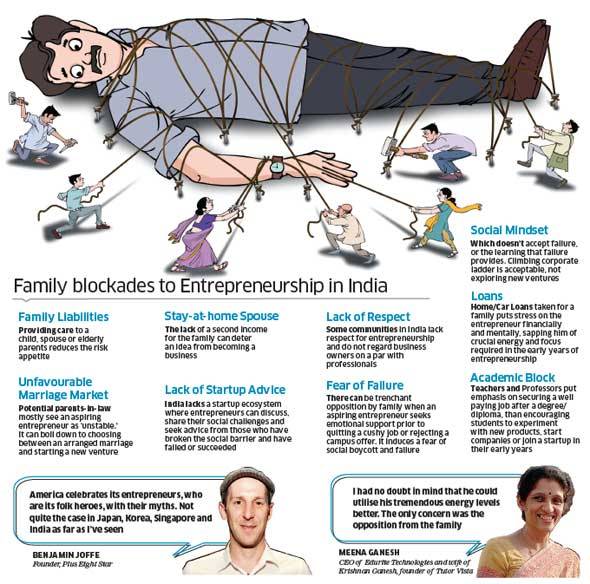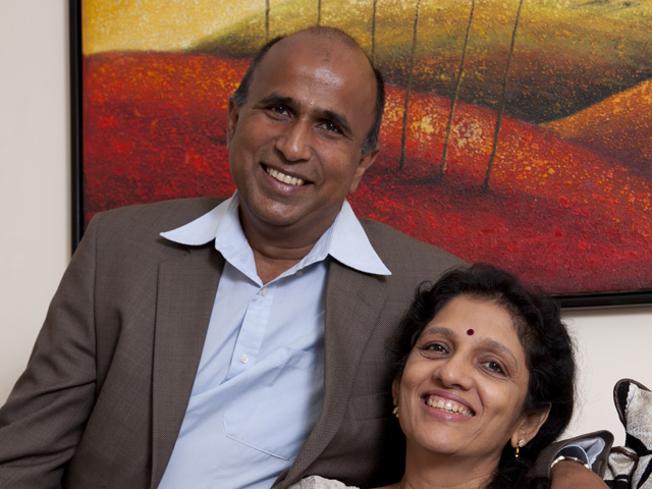In March 2009, the parents of IIT-Delhi alumnus Deepinder Goyal, 29, were perplexed to see their son working from home. After a few days, they began to worry. Their “worst fears” were confirmed when Goyal disclosed that he had quit his cushy job at consulting firm Bain & Co to set up a foodie website—Foodiebay.com. His parents were worried and advised Goyal to return to a “job.” But the company he founded, now called Zomato.com, received $2.3 million (about 12.3 crore) in funding in 2011, broke even with estimated revenue of more than Rs 3.5 crore in 2012, and has even expanded to west Asia and Europe. “They are extremely happy and proud now,” says Goyal.
Like Goyal, almost every aspiring businessman finds the leap to entrepreneurship brings with it difficulties that are not just economic. The fear of rebuke or rejection from family and friends is in most cases their first challenge.

“Resistance from families to risk is one of the three biggest inhibitors to entrepreneurship in India, the other two being capital and awareness,” says Sanjay Anandaram, a venture partner with Seed Fund and an active mentor to young entrepreneurs. “The Indian family system socially ostracises a failure.”
When IIT Roorkee alumnus and founder of property portal CommonFloor.com Sumit Jain, 27, wanted to set up his startup in the third year of his engineering course, his father, who owned a hardware business in Meerut, was vehemently opposed. “I was restrained by the family, which called me ‘confused’ and told me to study.”
After working for a year at Oracle in Bangalore, Jain quit, rented office space and cofounded CommonFloor.com with two other friends. The company has now scaled from three people in 2007 to 250 people, Jain has won funding from Accel India and Tiger Global, and is aiming for revenue of $25 million in 2014.
“We suffer from a dependency syndrome in India, of working for someone than creating jobs. Even the students in colleges are taught to become employees and never employers,” says Dr M D Usha Devi, Professor at Institute for Social and Economic Change (ISEC). “The mould is rather strong in lower middle class where the children have nothing to fall back upon and often prefer secure government jobs.”
The Societal Opposition
Not only at home, entrepreneurs are black-listed in the marriage market too, where they are mostly regarded as ‘unstable.’ “Entrepreneurs who wish to get married are told to go get a job,” muses Delhi-based Ajay Pal Singh, 26, who quit a job at STMicroelectronics to start HealthAssist.in in 2011, a provider of wellness plans to corporates. For the past few months, Singh has been trying to instill faith in his fiancée’s father about his business model. Singh’s startup was recently funded with about $40,000 (Rs 22 lakhs) by the Government of Chile’s startup programme. “Things are better in the family after the funding,” says Singh, though still unmarried.

Even for those who manage to tie the knot, there are problems on the home front, mostly from the mother-in-law. “When people ask me why I started so many businesses, I say to them because I wanted to prove it to my mother in law,” says Krishnan Ganesh, 51, founder and CEO of Tutor Vista. “The most upset person was my mother in-law when I quit my job, saying the only reason she allowed her daughter to marry me was because I was an IIM-Calutta guy with a good job.”
Ganesh married his childhood sweetheart Meena, who was also his classmate. While working for HCL in a senior management job was when the entrepreneurial bug bit him at the age of 29 and he launched IT&T,a computer maintenance services firm for corporate organisations.“I had no doubt in mind, that he could utilise his tremendous energy levels better. The only concern was the opposition from the family,” says Meena Ganesh, CEO at Edurite Technologies. That time, she continued her job at NIIT, a global computer education company. The turning point happened after one year when IT&T started to bag big customers.Later she also became an entrepreneur by launching CustomerAsset and roped in Ganesh as the co-founder. Meena has always been a sounding board for Ganesh, who would discuss ideas with here.

Ganesh is now, a serial entrepreneur with four successful ventures in the last 23 years.
In 2011, UK-based publishing house Pearson acquired a majority stake in his online education services company TutorVista for Rs 577 crore, valuing the five-year-old company at around Rs 1,000 crore.“As an entrepreneur he creates fantastic deals out of areas, which you can’t even think about and they are win win situation for all,” says Meena Ganesh.
Or take the case of Vizury co-founder and CEO Chetan Kulkarni, 36, whose family liabilities made him think twice to go backwards and wind up his start-up in 2009. “Just a month after I quit my job at Trilogy Inc, the doctor told me that my wife was expecting,” says Kulkarni.
The month after, Lehman Brothers collapsed. The founders had to survive on savings and on zero salary, for almost a year. But his wife – Ashwini, a legal consultant kept freelancing and supporting Kulkarni, to form a pillar, to make the $10 million (about Rs 55 crore) company, which it is today.
“It was a river of crocodiles. I can’t imagine how we crossed,” says Ashwini, the wife of Chetan Kulkarni. “I had quit from job as I was expecting. Both of us were without salary for almost a year. We had even planned to shift to a one room kitchen flat,” she adds.
“It’s important for spouses to not let an entrepreneur partner feel any guilt. If spouses are willing to sacrifice, more companies like Vizury will emerge,” says Ashwini, a lawyer by profession. Incidentally, Vizury raised its first round of angel funding on the day Kulkarnis had a son, in a small Bangalore hospital without any fancy facilities. Subsequently, Vizury raised a second round of $9 million in 2012.
How to Cope
Venture capitalists say knowing the background and mental status of an entrepreneur is part of their due diligence. “A company is like your little baby and it is important it should not come under any family pressure,” says Ramesh Radhakrishnan, partner at Artiman Ventures, which manages a global corpus of $750 million. Investors question about the family support to the business at every stage. Often, first time failed entrepreneurs don’t attempt a second startup because of the fear of being ostracised.
Sanjay Goel, 37, co-founder of Delhi-based technology company Srishti TechNet saw very rough turbulence in his career. His young company was on the verge of shutting down due to financial constraints and four of his key people left the firm to join bigger firms for fatter salaries. The exodus took the company backward and Goel had to start from scratch. Goel’s father supported initially and always wanted to continue to do so but it was a joint family and he was always afraid of what other brothers would say, if project goes bust. It was during this time that Goel’s wife who is a doctor took care of his daily expenses, tuition fees of the children and other basic necessities. “I was confident what he was doing is right for him, but I was worried, if he does not succeed, he should not have regrets and feel, ‘I am a failure in life,” says Dr. Rajeshwari Goel, 34, the wife of Sanjay Goel. The turnaround in Goel’s fortunes came last December, when One97 Communications, acquired mobile marketing platform MobiVite – owned by his company for a lucrative sum. “ I am now really proud of him as an entrepreneur. He is now very confident and developed a ‘third eye’ which intuitively tells him what will work what will not,” says Rajeshwari Goel.

What if a spouse doesn’t support your idea of a start-up? “Then you can kiss the venture good bye,” advices Debabrata Bagchi, 34, cofounder and CEO of Do Circuits, his second start-up. The IIT-Kharagpur alumnus says he made sure he paid up his home loan instalments and took his wife into confidence before taking the plunge in 2010. His start-up is in the process of raising about $1.5 million.
Harpreet Singh Grover, 29, cofounder and CEO of CoCocubes.com, advises aspiring entrepreneurs to go against the family and take the plunge. “You don’t want to be regretting at 40 years what you could have done at 30. After all you have only one life to live.”
Grover did not disclose to his family for several months, about his decision to quit a high-paying analyst job in Gurgaon in 2007. Two years later, CoCubes.com raised about Rs 3.5 crore from Ojas Venture Partners.
GenX Changing the Rules
An increasing number of students at India’s premier institutes such as ISB, IIMs and the IITs are skipping placements to set up or join a start-up. Like Parag Arora, 26, an IIT Delhi 2008 alumnus, who joined startup Webaroo. After six months, Arora turned entrepreneur and cofounded Travelomate, a travel portal. In 2012, he cofounded PlusTxt, a multi-lingual chat platform for Android and iPhones. It however took almost two-three months to convince his father, a government employee in Haryana, before he could take this plunge.

“At first parents become worried. Any parent would be,” says Simran Dhir, lawyer and wife of Ankur Singla, 28, founder of Akosha, a portal which solves consumer complaints. “Ankur had quit his job in London and came back to his hometown Panchkula to do his own venture. A strong qualification however gives parents some trust. Now, they are extremely proud, seeing him do well and happy,” says Dhir, who works with a Delhi law firm. “Relatives however, don’t understand what tech entrepreneurship is all about. So, we just say he is running a website or simply that he is a lawyer,” muses Dhir.
Breaking the cocoon, some people born in the 1990s are taking to entrepreneurship by choice. “It is a great revolution we are seeing in India today,” says Anandram of SeedFund. But the Indian Family is yet to play its part to contribute to the Start-up Ecosystem.
http://articles.economictimes.indiatimes.com/2013-01-25/news/36548273_1_young-entrepreneurs-seedfund-job
© TIL
–ENDS

Reader’s Comments — http://economictimes.indiatimes.com/opinions/18175429.cms
I like what you guys tend to be up too. This type
of clever work and reporting! Keep up the excellent works guys I’ve included you guys to my
blogroll.